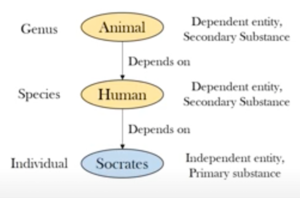Aristotle's Theory of Substance: Difference between revisions
No edit summary |
|||
| (10 intermediate revisions by the same user not shown) | |||
| Line 5: | Line 5: | ||
# Form | # Form | ||
{| class="wikitable" | |||
|- | |||
! scope="col"| | |||
! scope="col"| Plato | |||
! scope="col"| Aristotle | |||
|- | |||
! scope="row"| being | |||
| idea | |||
| form | |||
|- | |||
! scope="row"| becoming | |||
| receptacle | |||
| matter | |||
|} | |||
Aristotle finds the resolution to the ancient problem of '''''being''''' and '''''becoming''''' within the distinction of the terms matter and form. Plato believes that <u>being is the ideal object</u> found in the other (ideal) world, whereas <u>becoming is the receptacle</u> or material thing down here. | Aristotle finds the resolution to the ancient problem of '''''being''''' and '''''becoming''''' within the distinction of the terms matter and form. Plato believes that <u>being is the ideal object</u> found in the other (ideal) world, whereas <u>becoming is the receptacle</u> or material thing down here. | ||
For Aristotle being and becoming are found in each individual entity. <u>Every substance that there is, contains within it both matter and form</u>. | For Aristotle being and becoming are found in each individual entity. <u>Every substance that there is, contains within it both matter and form</u>. | ||
{{#ev:youtube|https://www.youtube.com/watch?v=rSMLb4ZTZIU|||||start=1&end=226&loop=1}} | |||
==Being said vs being in== | ==Being said vs being in== | ||
| Line 27: | Line 40: | ||
<hr>'''Being a human exists in virtue of individuals existing'''. | <hr>'''Being a human exists in virtue of individuals existing'''. | ||
Example 1: The form of a chair exists and depends on its particulars, i.e., the existence of an actual instance of a chair. Thus the form of the chair is real, it exists and '''''it is <u>in</u> the object''''' or | Example 1: The form of a chair exists and depends on its particulars, i.e., the existence of an actual instance of a chair. Thus the form of the chair is real, it exists and '''''it is <u>in</u> the object''''' or immanent; it is present in the object. See [[Immanent Realism]]. | ||
Example 2: There is an animal. This statement is true because there is Socrates, and Socrates is an animal. | Example 2: There is an animal. This statement is true because there is Socrates, and Socrates is an animal. | ||
Latest revision as of 14:45, 2 February 2023
In addressing the problem of dualism, and in trying to bring everything into unity, Aristotle developed his theory of substance. Plato had his theory of ideas, Aristotle had his theory of substance. And what Aristotle meant by this is that all individual entities, everything that exists in this world, exists as a primary substance.
According to Plato on the other hand, all the concrete objects that we find in this world are called receptacles. They are imperfect copies of the real ideas that exist in the other, the ideal world! For Aristotle, however, the individual objects, entities, and things that we encounter in this world are real. And they are substantial. And every substance is comprised of two aspects, or two things:
- Matter
- Form
| Plato | Aristotle | |
|---|---|---|
| being | idea | form |
| becoming | receptacle | matter |
Aristotle finds the resolution to the ancient problem of being and becoming within the distinction of the terms matter and form. Plato believes that being is the ideal object found in the other (ideal) world, whereas becoming is the receptacle or material thing down here.
For Aristotle being and becoming are found in each individual entity. Every substance that there is, contains within it both matter and form.
Being said vs being in
| Primary | Socrates | Socrates is an individual human being (OOP equivalent: instance); he is a substance; he continues to exist overtime; has all these distinct characteristics (OOP equivalent: properties) that belong to him. |
| Secondary | Human Animal Mammal ... | There is a human; there is an animal. The distinction is between an instance (i.e., an individual) in the kind of groups that it belongs. We are talking about one substance (instance) in a variety of different ways. These (e.g., the species he belongs, the genos he belongs etc.) secondary substances exist at higher level of abstraction. |
Being a human exists in virtue of individuals existing.
Example 1: The form of a chair exists and depends on its particulars, i.e., the existence of an actual instance of a chair. Thus the form of the chair is real, it exists and it is in the object or immanent; it is present in the object. See Immanent Realism.
Example 2: There is an animal. This statement is true because there is Socrates, and Socrates is an animal. In other words we are able to make the claim that there is an animal because we can make the first claim, there is Socrates!
Conclusion
| Form | Being | Form is that what gives the object, or the subject, its being. Without participating in being, without containing being, whatever is couldn’t be, so that you couldn’t have any real things or real objects unless there was some being within them. |
| Matter | Becoming | But also, things in this world, physical things, “material things” as we know them, also have elements of change, elements of “becoming.” That is part of the matter of a thing. |
